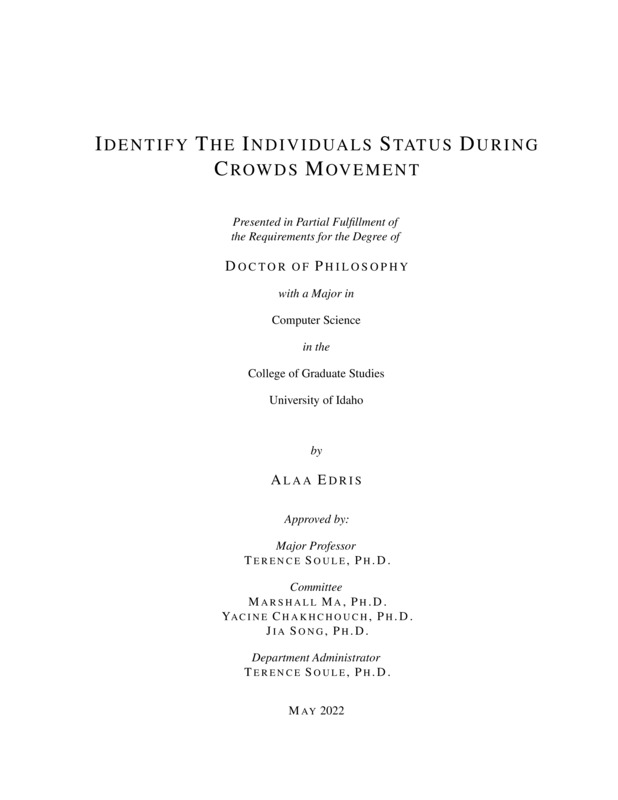Identify The Individuals Status During Crowds Movement
Edris, Alaa. (2022-05). Identify The Individuals Status During Crowds Movement. Theses and Dissertations Collection, University of Idaho Library Digital Collections. https://www.lib.uidaho.edu/digital/etd/items/edris_idaho_0089e_12355.html
- Title:
- Identify The Individuals Status During Crowds Movement
- Author:
- Edris, Alaa
- Date:
- 2022-05
- Program:
- Computer Science
- Subject Category:
- Computer science; Artificial intelligence
- Abstract:
-
Crowds form for a variety of reasons and crowd control must be considered in order to provide a safe and enjoyable experience when a massive gathering of people forms a moving crowd. Providing for public safety is an important matter for authorities in order to provide civilians with the ability to proceed with their routine life and work. However, authorities face complex and costly processes when controlling large events, especially when crowds start moving. Authorities face many challenges when organizing a crowd in order to provide successful crowd management to prevent an unwanted catastrophe. We examine the two major types of crowd behavior, the movement of a structured crowd where people head in one direction with the same goal or destination, and the movement of unstructured crowds where people head in different directions with different goals or destinations.
This proposal develops an alert system for crowd control to keep the crowd away from dangerous situations. The main idea of behind the alert system is monitoring the individuals’ locations by scrutinizing the position status of the individuals in the crowd at a particular moment in order to inform the authorities about unusual individuals’ behavior. A Fuzzy Logic algorithm was developed for the alert system; it makes decisions regarding the critical density spots that might obstruct smooth crowd motion. We created a system of crowd monitoring that analyzes every individual in the crowd by scrutinizing their position’s status to allow the fuzzy logic system to identify the critical density spots in order to point out these potentially obstructive locations to authorities who would then be able to intervene.
- Description:
- doctoral, Ph.D., Computer Science -- University of Idaho - College of Graduate Studies, 2022-05
- Major Professor:
- Soule, Terence
- Committee:
- Chakhchoukh, Yacine; Ma, Xiaogang; Song, Jia
- Defense Date:
- 2022-05
- Identifier:
- Edris_idaho_0089E_12355
- Type:
- Text
- Format Original:
- Format:
- application/pdf
- Rights:
- In Copyright - Educational Use Permitted. For more information, please contact University of Idaho Library Special Collections and Archives Department at libspec@uidaho.edu.
- Standardized Rights:
- http://rightsstatements.org/vocab/InC-EDU/1.0/

